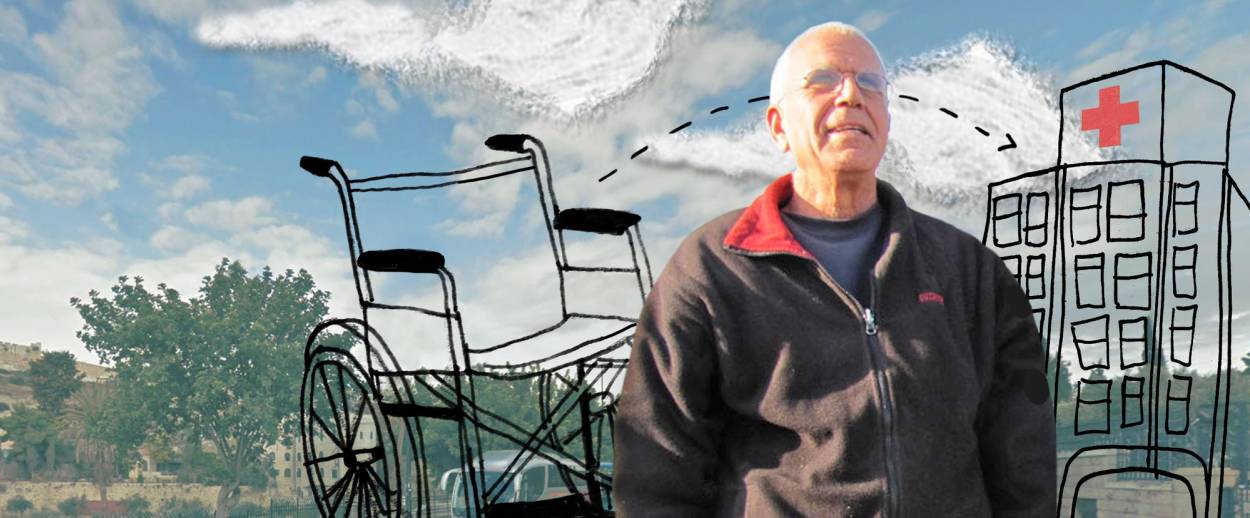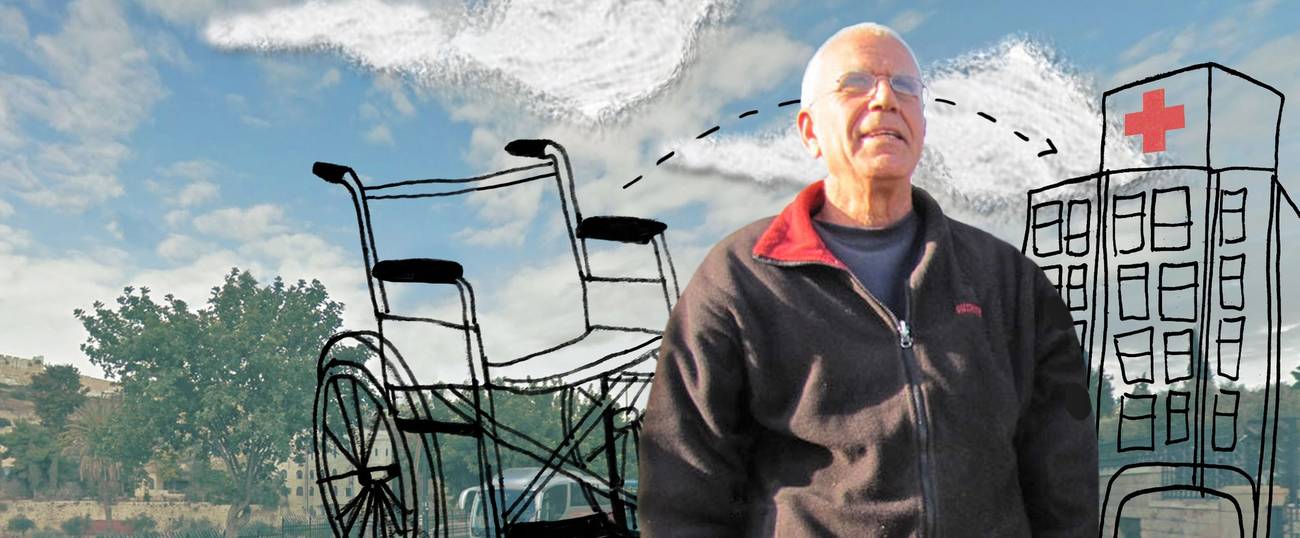Hamas Murdered Yuval Roth’s Brother. Now He Helps Sick Palestinians.
With an effort at personal bridge-building, one Jew created an outpost of hope that defies polarization among governments




The 70 miles from Pardes Hanna to Gaza seemed impassable last summer. But Yuval Roth, 60, didn’t have time for fear or despair. Since starting Derech Hachlama (“the way to recovery”) in 2006, every morning at 6 he’s already on his way from his home in Pardes Hanna to pick up Palestinians at a border crossing, where some 12 volunteers out of the organization’s bank of 500 use private vehicles to drive 30 to 50 Palestinians a day to Israel for medical care.
Derech Hachlama is an outpost of hope—a triumph of personal bridge-building that defies polarization among governments. That, at least, is Yuval Roth’s dream. Even at the height of the missile wars between Israel and Hamas, he continued to believe that the only way to end the conflict would be through initiatives that bring Palestinians to encounter a different Israel—an Israel where not every citizen wears an army uniform, and where Israelis and Palestinians might together build the mutual trust that may be the foundation for lasting peace. In the meantime, he helps save lives.
Mary, a 6-year-old from al-Yamun, a town in the northwestern West Bank, had to get to Sheba Medical Center near Tel Aviv for a treatment for spina bifida, an illness of the spine. At 7 a.m. on a Tuesday Roth was waiting at the Barta’a (Reihan) crossing, between Israel and the Palestinian Authority. The girl’s father Amjad rolled his daughter’s wheelchair and the smiling girl lifted herself onto Roth’s white Citroen using a special orthopedic outfit. Three months before, Mary successfully underwent a dangerous corrective spinal surgery, but she still couldn’t move her lower body.
After a U-turn, Roth was heading toward Tel Aviv, engaging his passengers in a detailed conversation in Hebrew about their medical condition (politics is usually off limits). By 9:30 a.m., she was in the clinic. In three hours, Roth would pick her up as well as another father and daughter, from Nablus, whom a volunteer had dropped off earlier.
“When a friend told me about Yuval I said I can’t believe there were people like that,” said Amjad. “I used to pay 300 shekels a day for taxis and had to leave home at 5 a.m to make it to a 9 a.m. appointment. We’ve been with Yuval for four years now. Two years ago I invited him to our place, then took his picture and hung it on the wall. Every guest gets to hear about this amazing Jew, whose brother was murdered but chose to take an undertaking for peace instead of revenge. Today everybody in our village knows the story.”
***
In October 1993, Roth’s brother Udi was on his way home from reserve service in Gaza, then under Israeli military control, when he and a fellow soldier were kidnapped and murdered by Hamas terrorists. “I was your typical leftist, grumbling at home but not engaged,” Roth said, “until my personal tragedy changed my life. I lost a brother but not my head, and didn’t want revenge. Yes, I was angry, but my anger was directed not at the terrorists that killed my brother but at our leaders, that for generations were unable to solve the conflict. The murder happened during the Oslo era,”—after Israel and Yasser Arafat’s PLO signed an agreement of mutual recognition—“and I was in a state of euphoria. I believed that peace was around the corner, when it happened. I realized that I couldn’t just sit at home when peace was slipping away. I decided to get out and, despite the pain and difficulty, to try to make a difference.”
Roth joined The Parents Circle Families Forum, a pro-peace Israeli-Palestinian organization of families who have lost a family member in the conflict. There he met Mohamed Kabah, a Palestinian from the village Yaabez near Jenin, who also lost a brother. Kabah approached Roth with an unlikely request. He had a sick brother in medical care in Haifa who couldn’t get to the hospital. “So, I drove him thinking this was no different from what I’d do for a neighbor in Pardes Hanna. Then this friend referred another family from his village who needed help to reach Hadassa,” the Jerusalem hospital. One referral followed another, and soon there was too much traffic for one person to handle. “So, I reached out to my circles of friends.”
Kabah also takes pride in helping the launch of Derech Hachlama. “Yuval and I met 15 years ago,” he said by phone, “we both lost brothers in war and shared the conviction that we must do something to bring people closer together.” And it was important to get the collaboration of administrators. “We met with leaders of the [Palestinian] Authority, we kept them informed,” Kabah said. “I think our contribution to peace is greater than that of many leaders. Today, there’s no Palestinian in the Territories who isn’t grateful to Yuval. This organization made us heroes. Still, many say that it’d be too hard to achieve peace. But this is our way to say that the pain of peace is better than the pain of war.”
Yet reality on the ground can be frustrating. On route to Sheba, Amjad described, in Hebrew, the hassle of crossing the border. “Even when we have all the permits, we may be held for hours in the crossing.” It’s telling that Israelis use the word for barrier, makhsom, to refer to crossing. Tensions in the crossing naturally run high. Amjad recounted how once Israeli soldiers didn’t let them pass after “my son played with Mary’s orthopedic device. They passed the device through the screening machine but they suspected it was a bomb.” But Amjad quickly curbed his criticism. “Despite this situation, we try to be optimistic.”
***
The Palestinians may not have a state, but they already boast a bureaucracy. “Six weeks ago I was in Ramallah for coordination with the Palestinian health ministry” Roth said. On the Israeli side he works closely with the Coordination of Government Activities in the Territories, an IDF outfit, which issues the permits for Palestinian seeking medical care in Israel. “The warmest responses, naturally, are from Palestinians,” said Roth, “two and a half years ago the governor of Jenin”—then Kadura Musa—“honored our 70 volunteers in Jenin. It was exciting to see 70 Israelis strolling the streets of Jenin, visiting the market and restaurants.”
Closer to home not everybody is supportive. Some Israelis tell him that charity begins at home. A different criticism originates from his family: that he devotes too much time to Derech Hachlama, from which he doesn’t take a salary. Professionally, Roth is a juggler and carpenter, and he also juggles Derech Hachlama, “which is really around the clock, with pressure and phone calls on end. It affects the family too. I got someone to oversee our activities in the north but after a short while she gave up.”
Only in 2009 did Derech Hachlama officially register, the outcome of an encounter with Leonard Cohen, who, in Israel for a concert, heard about Roth and wrote him a $10,000 check. “We met his personal manager who said Leonard decided to help and made a donation,” said Roth. “His donation pushed me to found Derech Hachlama and enabled us to increase the number of volunteers as we could reimburse them for gas.” Another boost was in 2011 when CNN listed Roth as one of its 24 “Heroes” for the year. “It was nice and helped a little with fundraising but not much more,” he said. “At the end, the feeling that we did something that really helped is more significant than any award or publicity.”
Roth also juggles Palestinian and Israeli officials. “During Operation Protective Edge I drove a 7-year-old girl back from the Rambam hospital in Haifa to Gaza,” he recalled. “Afnan had cancer and after nine months in hospital all she wanted was to be back home and couldn’t care less about the war.” But the Erez crossing on the Gaza border was closed, so officials in the Coordination of Government Activities in the Territories instructed him to wait. Kibbutz Hatzerim near Beer Sheva where Roth grew up proved a surrealistic rest stop. While fighter aircrafts heading toward Gaza took off from the nearby Hatzerim Air Base of the Israeli Air Force, Afnan was riding a bike in the pastoral kibbutz. When the alarm sounded, Roth said, “the children were shocked to find a girl from Gaza in the shelter. One girl asked her whether she, too, launches missiles, and another wondered, ‘Isn’t it winter now in Gaza?’ ”
Roth wishes that Israelis would give more credit to Palestinians. “The Israeli public doesn’t understand how deep is the Palestinian will for peace. It’s not the reasonable minority but the reasonable majority. The majority of the Palestinian public wants a two-state solution and supports the nonviolent path of Abu Mazen. It will take time for the Israeli public to process this picture, but I have no doubt that is the reality. And although I don’t think Netanyahu has the will to and courage for peace, I believe some processes are greater than any person.”
Yet misunderstanding is also rampant on the Palestinian side, according to Roth. “The picture of Israelis in the eyes of the Palestinian is very one-dimensional. They hear ‘Israel’ and think of a crossing, a settler, and a soldier with a weapon. But we offer a different horizon and help change consciousness,” he said. “I don’t know to what extent our actions help bring peace but I do know that in the chaos, this is the biggest small step I can make.”
***
You can help support Tablet’s unique brand of Jewish journalism. Click here to donate today.
Tal Miller, a former speechwriter for the IDF’s chief of staff, is a writer for Yediot Aharonot. Yoav Sivan is a New York-based journalist.